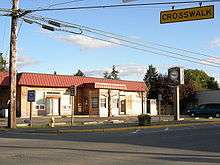Snoqualmie Indian Tribe
The Snoqualmie Indian Tribe (S·dukʷalbixʷ), is a federally recognized tribe of Snoqualmie people. They are Coast Salish Native American peoples from the Snoqualmie Valley in east King and Snohomish Counties in Washington state.
 Snoqualmie tribal office, Carnation, Washington | |
| Total population | |
|---|---|
| approximately 650 | |
| Regions with significant populations | |
| City of Snoqualmie Greater Seattle Area | |
| Languages | |
| English, Southern Lushootseed | |
| Religion | |
| Christianity, traditional tribal religion | |
| Related ethnic groups | |
| other Snoqualmie people |
History
Some Snoqualmies settled onto the Tulalip Reservation after signing the Point Elliott Treaty with the Washington Territory in 1855, but many remained in their ancestral homelands around the Snoqualmie Valley and Lake Sammamish. At that time they were one of the largest tribes in the Puget Sound region numbering around 4,000.[1] They have tried and failed on several occasions to secure a reservation on their ancestral lands along the Tolt River (a tributary of the Snoqualmie River). Instead, they purchased land for and were granted a reservation near Snoqualmie, Washington, on which the tribe opened the Snoqualmie Casino in 2008.[2]
Law enforcement
In 2008, the Snoqualmie Tribe Police Services was established to enforce tribal laws at the new Snoqualmie Casino near Snoqualmie, Washington. In the summer of 2008, the department hired a Chief who was supposed to hire a force of up to six officers to patrol the Casino and the Reservation property. However, in the spring of 2009 the tribe did not receive the funding they anticipated from the BIA, and disbanded the department. The tribe now contracts law enforcement out to the King County Sheriff's Office on a "calls for service" only basis. The Sheriff's Office does not actively patrol the casino—no one is assigned there—but the Sheriff's Office will respond to calls when needed and the tribe is billed per call for service.
Recognition by the United States
The tribe lost federal recognition in 1953. In October 1999, the Bureau of Indian Affairs once again granted recognition to the Snoqualmie.[3]
Membership and government
According to one source, the Snoqualmie Tribe currently has approximately 597 members.[4] Another source puts the membership at approximately 650 members.[5]
The government consists of a tribal constitution and elected council.
Notes
- Krishnan, Sonia (2005-01-04). "Snoqualmie Tribe on road to self-sufficiency". nathpo.org.
- Miletich, Steve (2008-11-02). "Snoqualmie Tribe's big bet: The casino that almost wasn't". The Seattle Times. Retrieved March 6, 2019.
- "Snoqualmie Tribe History" (website). Governor's Office of Indian Affairs. Retrieved 7 March 2008.
- "History of the Snoqualmie Tribe". 19 November 2006. Archived from the original on 15 June 2006. Retrieved 21 January 2008.
- "Snoqualmie Entertainment Authority Closes On $330 Million Casino Financing" (PDF). Snoqualmie Indian Tribe/Snoqualmie Entertainment Authority. 29 January 2007. Archived from the original (PDF) on 24 July 2008. Retrieved 21 January 2008.
Further reading
- Tweddell, Colin E. The Snoqualmie-Duwamish Dialects of Puget Sound Coast Salish: An Outline of Phonemics and Morphology. University of Washington publications in anthropology, v. 12. Seattle: University of Washington Press, 1950.
External links
| Wikimedia Commons has media related to Snoqualmie (tribe). |